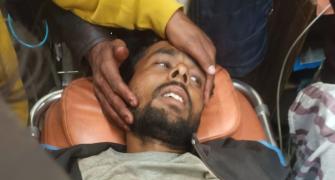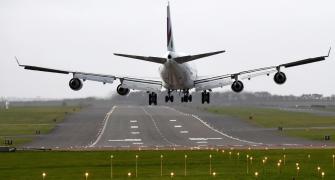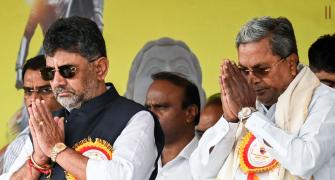An occupational medicine specialist, he will be in India for the Easter 2009 run. The Rickshaw Race usually attracts people in their twenties, but Dr Hill, 53, says though some feel he is nuts, he has made up his mind. He spoke to rediff.com's Arthur J Pais.
What is your team called?
It is called The Blazing Chillies and consists of three genetically linked but impaired individuals -- my sister Susan, her son Charles and, of course, me. My sister is a law professor in the United Kingdom and Charles is studying at a university there.
What is your friends' and acquaintances' reaction when they hear about this race?
Some believe I am nuts. Some think I should not go to India because of the recent terrorist attacks in Mumbai. Some are concerned that I am not all that young to take up something as adventurous as this. (Chuckles). But I have made up my mind and I am eagerly looking forward to this race. And so is my sister who is even older than I am. She is 54.
What do you tell the people who ask you not to go?
I tell them that there are over 1.1 billion people across India. Three people -- two of them quite old -- pedalling across India should not worry anyone. Besides, I believe that life is too short to worry too much about safety and terrorism. I was at the Taj little more than a week before it was seized by the terrorists but I am prepared to visit it all over again.
When did you hear about this race?
I heard about the Rickshaw Run a few years ago and thought driving across India in a motorised rickshaw would be an amazing adventure. I also felt that the opportunity to raise money for charity through this race is a real bonus.
How did your sister and nephew get interested in the race?
I managed to secure the last team slot on the Easter 2009 run. I booked without thinking, not worrying who will join me or what route I should take which was probably a good thing! When I proposed this idea, my sister and nephew got very excited and committed themselves within days. Later, I began hearing from many people here saying they would have liked to join the race.
How will you solicit donations?
We are trying to generate $15,000 for charity via personal donations and company sponsorships. Companies can sponsor us and we will have their logo painted on our motor rickshaw.
What are the charities that you will be helping?
Frank Water Projects offers sustainable, affordable, clean water projects using the latest technology. Frank Water is working in partnership with Water Health International (technologists) and Naandi (a local non-governmental organisation), in funding and implementing community clean water projects across India.
SOS Children's Villages has been providing a family for life for children who have lost their parents through war, famine, disease and poverty since 1949. SOS mums take care of more than 70,000 orphaned or abandoned children in clusters of family homes in more than 470 unique children's villages in 123 countries around the world. A further million benefit from SOS Children's outreach support, which includes education, vocational training, medical care and community development programme.
Are you afraid of anything on this tour?
The traffic in India and the condition of the roads scare me a bit. The Indian roads have 6 per cent of the world's road accident deaths and 10 per cent of the world's vehicle accidents, despite only having 1 per cent of the world's road vehicles. I believe one person dies and 10 are injured every six minutes.
On my way from Mumbai to Nashik -- I was driven, though -- I saw more than a dozen serious accidents. I am sure there were fatalities.
How about the motor rickshaw?
The other challenge is the 3-wheeled motor rickshaw with a 150cc engine and (providing) a scary 7HP at 5,000 rpm, giving it a top speed of 30 mph with a good wind. The rickshaw is undoubtedly the ultimate long-distance, off-road machine, despite being designed for short distances. At such speeds, 8 to 10 hours of driving will be required each day to reach Goa in time.
How did you start preparing for the race?
On a recent trip to India I managed to arrange a test drive in Nashik. It was great fun. People were, of course, curious to see a foreigner riding a rickshaw. Some were indeed amused.
My sister says on her blog that she has read a lawn-mover manual. She reckons she can change tubes and plugs. She says Charles will practice staying 'cool' in the shape of a coiled spring -- as that is the shape he and his 6' 5" frame will need to adopt for the race.
What route will you take?
The race starts in the lush green hills of Shillong, goes into Bangladesh and then thunders through steamy Indian plains and jungles, finally ending on the glorious beaches of Goa. There is no support for the trip. The organisers hire the rickshaw and arrange a party at the beginning and the end. Everything else from the route -- accommodation and repairing the rickshaw -- is up you.
How many teams are there and what is the most important thing they should remember?
There are 65 teams this spring. The race is held three times a year. The quickest you can possibly do it is in 10 to 12 days, which means travelling 8 hours a day. It is important for us to remember that this is for charity, not for any prize or money. I've been told the locals often will help fix your (vehicle) if it breaks down, because they know the whole thing is for charity.
In the many trips I have made across India, I have never failed to see how friendly and helpful people there are.
Will you have time for some sight-seeing?
I am sure we will be doing it. We are surely interested in seeing some monuments and historical places on the way. We hope to go through forests and parks. I hope we can go through at least one tiger reserve. It'd be nice to see some tigers in their natural habitat along the way.
Will all three of you be driving?
We will take turns. The biggest challenge perhaps will be for my nephew who is 6'5". He is two inches taller than me. His mother is about 5'6". We are aware of these factors.
When did you first visit India?
I first went to India in 1993 and since then have travelled there on business about 12 to 13 times, generally visiting Mumbai but I have visited Delhi, Chennai, Mysore, Bangalore, Jaipur, Hyderabad, Nashik, Ankleshwar, Goa and several other places.
Since my first visit I have been fascinated with the old and the new. (There are) the amazing old temples and buildings: Fatehpur Sikri, Ajanta and Ellora caves, Taj Mahal, the Mughal forts and palaces... The new is equally fascinating. There is life everywhere, even when travelling on trains in the (rural) areas.
I don't think that I have ever looked out of the window and not seen someone (interesting). There is poverty, which is sad to see, but despite this, people seem much happier than in the West.
What are the most memorable, provocative, and funny experiences you have had in India?
Memorable: Walking through Fatehpur Sikri when there was hardly anyone there. It had a wonderful ambience, and I understand why they built the city there -- it is a shame that the water supply ran out and the people left.
Provocative: Visiting the Haji Ali shrine in Mumbai -- and hearing four armless and legless beggars lying in a circle, singing.
Funny: Watching the face of a colleague who had to use a restroom on a train. If you have been there, you know that the standard and arrangement are different from that in the West.
Of course, I also remember trying to water-ski after drinking Hayward's 5000, a very strong beer, from Goa.
Do you like Indian food?
I absolutely adore it, and I eat very hot food. I moved to the US (from the United Kingdom) years ago. And when we first came there were few Indian restaurants (in and around Philadelphia). I found the Indian food here very different from that found in the UK. However, over recent years there have been many new restaurants opening up near where we live in Pennsylvania. (There are) also Indian supermarkets so I can get the ingredients to cook, which is another hobby.
What kind of diet will you follow in India?
We will stick to a mostly vegetarian diet. It will be safer and also not make us feel sluggish. Besides, I love Indian vegetarian cooking. In England, everyone enjoys Indian food, and my sister and her son are also used to Indian food.
Have you always been interested in discovering different regions of the world?
From my childhood I have been exposed to a number of cultures and the fascination still remains with me. My father worked for the British Royal Air Force. I was raised in England, Bahrain and Singapore. I went to Manchester University Medical school...
What are the most important pieces of advice you can give to your sister and nephew to prepare them for the race?
Write a will -- the roads are dangerous. Get used to having people around you -- privacy is not so easy to find in India. I told them about how I would be looking at a photo, and suddenly there would be many people next to me looking at it, too!







